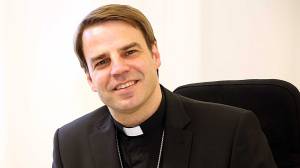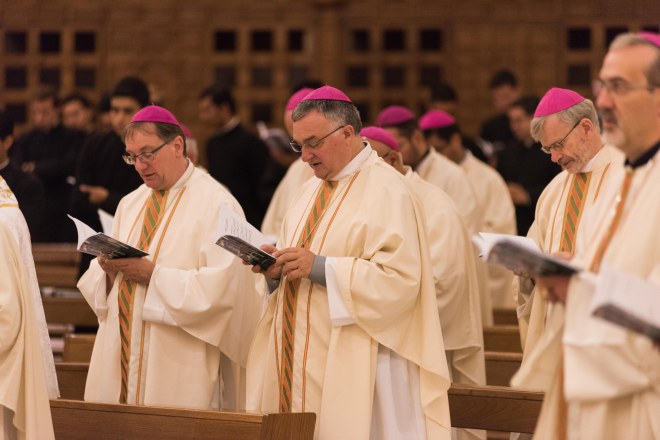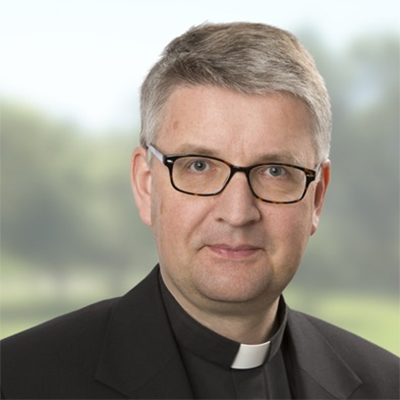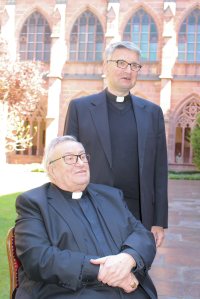Despite assurances to the contrary, the German episcopate as a body continues to be seen by many as plotting a course independent of Rome when it comes to questions about the sacraments, the priesthood and synodality. That said, several bishops have recently spoken out in defence of one topic which, certain circles claim, should be abolished if the Church is to change for the better: mandatory celibacy for priests.
 The main contribution, certainly in word count, comes from Bishop Dominikus Schwaderlapp, auxiliary bishop of Cologne, who wrote an article about the topic for the Tagespost (subsequently also published on Domradio), with a focus on the issue in the context of the abuse crisis. Identifying the call to abolish celibacy as conservative because it is, by now, a somewhat old-fashioned position, the bishop asks, “Why is my celibate way of life always criticised so strongly by people who don’t have to live it at all? Didnt I make that choice, not you?” He adds that no one forced him to choose to live celibate. Bishop Schwaderlapp explains the value of celibacy for a priest:
The main contribution, certainly in word count, comes from Bishop Dominikus Schwaderlapp, auxiliary bishop of Cologne, who wrote an article about the topic for the Tagespost (subsequently also published on Domradio), with a focus on the issue in the context of the abuse crisis. Identifying the call to abolish celibacy as conservative because it is, by now, a somewhat old-fashioned position, the bishop asks, “Why is my celibate way of life always criticised so strongly by people who don’t have to live it at all? Didnt I make that choice, not you?” He adds that no one forced him to choose to live celibate. Bishop Schwaderlapp explains the value of celibacy for a priest:
“It is not just a fitting oneself into the order of the Church. Celibacy is not limited to a – sometimes painful – denunciation of an exclusive two-way relationship of one’s own in order to have time and space for the many. And as such it is more than “just” the adoption of Jesus’ lifestyle – it is after all Him whom the priest is to make tangible in his life. Celibacy means a self-giving to Christ. with body and soul. And with and through Christ it means a self-giving to the people. It is about making the open heart of Jesus tangible through the celibate way of living. Being a priest is a matter of the heart, otherwise it becomes a caricature.”
The bishop likens this act of self-giving, which includes the priest sexuality, to what a husband and wife do in marriage. Rather than giving themselves to each other, with body, soul and sexuality, a priest gives himself to God.
Not blind to the challenges facing the Church and society, Bishop Schwarderlapp nonetheless concludes that allowing priests to marry is not an answer.
“This charism makes the purpose and mission of the priest “physical”: to make Jesus Christ visible, audible and tangible in this world. Incidentally, celibacy is always outdated because it refers, across time, to the one who was, who is and who will come. It is fatal if this charism is put up for discussion, and when we bishops take part in it. There are no new factual arguments against celibacy. [Abolition] would not serve as a remedy to abuse, nor as an impetus to the – much needed – inner renewal of the Church. There has never been renewal by less, but always only through more devotion.”
 Bishop Helmut Dieser of Aachen expresses himself in similar words. He too emphasises that celibacy is not something negative, nor something that is forced upon a priest. It is, he states, “a Biblical way of life in imitation of Jesus, a charism”. However, he also says, should a situation exist when there are no men choosing celibacy, the Church should keep “suitable married men” in mind. This openness to the practical situation, which at this time does not exist in Germany, is echoed by Bishop Stefan Oster of Passau. His position in an interview, which he shared on his website, caused some confusion as it appeared as if he was in favour of loosening the celibacy rules. “I am not, even when I consider it possible,” he tersely explains. Bishop Oster also explains that there is room to discuss the question of celibacy: “The question is not dogmatic. Unlike with sexual morality there is more leeway, and the pope has already encouraged the search for new ways in this regard.”
Bishop Helmut Dieser of Aachen expresses himself in similar words. He too emphasises that celibacy is not something negative, nor something that is forced upon a priest. It is, he states, “a Biblical way of life in imitation of Jesus, a charism”. However, he also says, should a situation exist when there are no men choosing celibacy, the Church should keep “suitable married men” in mind. This openness to the practical situation, which at this time does not exist in Germany, is echoed by Bishop Stefan Oster of Passau. His position in an interview, which he shared on his website, caused some confusion as it appeared as if he was in favour of loosening the celibacy rules. “I am not, even when I consider it possible,” he tersely explains. Bishop Oster also explains that there is room to discuss the question of celibacy: “The question is not dogmatic. Unlike with sexual morality there is more leeway, and the pope has already encouraged the search for new ways in this regard.”
About celibacy itself, the bishop says:
 “Celibacy is the way of life of Jesus and as such a great spiritual treasure, which is worth fighting for. But I do not rule out the possibility (of a loosening of the celibacy rules). When the majority of priests say that it is no longer possible to live celibately in this time and society, then it becomes difficult. On the other hand I do not want the priest who is already struggling with his way of life, but who has made an oath, now reading, “the bishop also says that it is difficult, so I’ll also give it up.” I do not want to demotivate, I want to say: the struggle is worth it.”
“Celibacy is the way of life of Jesus and as such a great spiritual treasure, which is worth fighting for. But I do not rule out the possibility (of a loosening of the celibacy rules). When the majority of priests say that it is no longer possible to live celibately in this time and society, then it becomes difficult. On the other hand I do not want the priest who is already struggling with his way of life, but who has made an oath, now reading, “the bishop also says that it is difficult, so I’ll also give it up.” I do not want to demotivate, I want to say: the struggle is worth it.”
The new bishop of Fulda, Michael Gerber, who will be installed today, has also said that he is opposed to abolishing mandatory celibacy, and prefers to focus instead of assuring that priests remain part of a ‘network’, thus preventing any of them from falling prey to loneliness.
Other bishops, such as Peter Kolhgraf of Mainz and Georg Bätzing of Limburg, have expressed their support for voluntary celibacy, showing that, if anything, the German episcopate is no monolith.
Photo credits: [1] Erzbistum Köln, [2] Elisabeth Schomaker/KNA, [3] Bischöfliche Pressestelle Passau


 Although not unexpected following the prayer request for his health, issued last week by Bishop Peter Kohlgraf, the death of Cardinal Karl Lehmann, early yesterday morning, is a sad conclusion to a long lifetime of service to the Church, one that coincided with and shaped the past decades of her life and development.
Although not unexpected following the prayer request for his health, issued last week by Bishop Peter Kohlgraf, the death of Cardinal Karl Lehmann, early yesterday morning, is a sad conclusion to a long lifetime of service to the Church, one that coincided with and shaped the past decades of her life and development. Bishop Ron van den Hout, at left, concelebrates the daily Mass during the course for newly-appointed bishops.
Bishop Ron van den Hout, at left, concelebrates the daily Mass during the course for newly-appointed bishops.


 Almost a year after the retirement of Cardinal Karl Lehmann, all the dioceses of Germany have a bishop at the helm again – a situation that has not existed for several years. Succeeding the cardinal who led the Diocese of Mainz for 33 years is Father Peter Kohlgraf.
Almost a year after the retirement of Cardinal Karl Lehmann, all the dioceses of Germany have a bishop at the helm again – a situation that has not existed for several years. Succeeding the cardinal who led the Diocese of Mainz for 33 years is Father Peter Kohlgraf.